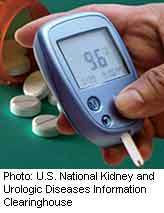(HealthDay) -- For patients with inadequately controlled type 2 diabetes, treatment with dapagliflozin is associated with improved glycemic control, stabilized insulin dosing, and weight reductions, according to research published in the March 20 issue of the Annals of Internal Medicine.
To evaluate the efficacy and safety of dapagliflozin, John P.H. Wilding, D.M., of University Hospital Aintree in Liverpool, U.K., and associates randomly assigned 800 patients with inadequately controlled type 2 diabetes, receiving at least 30 units of insulin daily, with or without up to two oral antidiabetic drugs, to receive a daily dose of dapagliflozin (2.5, 5, or 10 mg) or placebo for 48 weeks.
After 24 weeks, the researchers found that patients taking dapagliflozin had a 0.79 to 0.96 percent decrease in mean hemoglobin A1c, compared with a 0.39 percent decrease with placebo. The daily insulin dose decreased by 0.63 units with dapagliflozin compared with an increase of 5.65 units in the placebo group. Dapagliflozin was associated with a decrease of 0.92 to 1.61 kg in body weight, compared with an increase of 0.43 kg in the placebo group. At 48 weeks, these effects were maintained. Patients in the pooled dapagliflozin groups had a higher rate of hypoglycemic episodes compared with the placebo group (56.6 versus 51.8 percent).
"Dapagliflozin improves glycemic control, stabilizes insulin dosing, and reduces weight without increasing major hypoglycemic episodes in patients with inadequately controlled type 2 diabetes mellitus," the authors write.
The study was funded by AstraZeneca and Bristol-Myers Squibb, co-developers of dapagliflozin. Several of the authors are employees of AstraZeneca.
More information:
Abstract
Full Text (subscription or payment may be required)
Editorial (subscription or payment may be required)
Journal information: Annals of Internal Medicine
Copyright © 2012 HealthDay. All rights reserved.



















